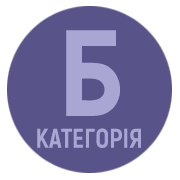THE DISTINCTIVE FEATURES OF TRANSLATION COMPETENCE DEVELOPMENT IN PRE-SERVICE TRAINING OF FOREIGN LANGUAGE AND LITERATURE TEACHERS
DOI:
https://doi.org/10.32782/philspu/2023.1.7Keywords:
pre-service teachers, foreign language and literature, translation competence, translation training, content, forms, methodsAbstract
The article highlights some aspects revealing the development of translation competence of prospective foreign language and literature teachers. Attention is focused on internal and external factors necessitating the development of translation competence of pre-service foreign language and literature teachers. The study identifies the needs of the specialized school and the requirements for translation teaching courses in senior classrooms of specialized schools. The author analyzes scholarly perspectives on the concepts of ‘translation’ and ‘translation competence’. On this basis, the essential characteristics of translation competence in pre-service training of foreign language and literature teachers are substantiated. Translation competence has been found to be an integrated characteristic that involves the ability to translate authentic texts at the appropriate level and understand their content, as well as to implement the information received in accordance with the target audience and further use in foreign language education and intercultural communication. It has been proved that developing the translation competence of prospective foreign language and literature teachers requires the introduction of innovative approaches to structuring the professional training content and the implementation of innovative forms and methods of translation teaching. The study outlines controversial issues and problems in undergraduate training of foreign language and literature teachers in terms of the learning outcomes reached as a result of interpretation and translation courses. Ways to improve the content of professional training based on the development and thematic updating for the content of mandatory and optional educational components are proposed. The research provides the analysis of the ways in which unassisted translation work with foreign language texts and native speakers should be organized. Particular attention is paid to the use of innovative methods and technologies of translation training provided to prospective foreign language and literature teachers.
References
Навчальна програма з іноземних мов (рівень стандарту, профільний рівень) для 10-11 класів загальноосвітніх шкіл, затверджена Наказом Міністерства освіти і науки № 1407 від 23 жовтня 2017 року.
Лінгводидактичні засади навчання іноземної мови учнів старших класів загальноосвітніх навчальних закладів: навчально-методичний посібник / Редько В. Г., Полонська Т. К., Басай Н. П. [та ін.] ; за наук. ред. Редька В. Г. Київ : Педагогічна думка, 2013. 360 с.
Професійно орієнтоване навчання іноземних мов у старшій профільній і вищій школі: проблеми і перспективи : колективна монографія / Л. А. Сажко, Л. Я. Зеня, О. В. Бирюк та ін. / за заг. ред. Л. А. Сажко. Київ : Вид. центр КНЛУ, 2015. 225 с.
GALA. What is Interpreting? Language Industry Definitions. URL: https://www.gala-global.org/what-interpreting.
Скиба К. М. Теорія і практика професійної підготовки перекладачів у США [Текст] : автореф. дис. ... доктора пед. наук : спец. 13.00.04 «Теорія і методика проф. освіти» ; МОН України, Вінницький державний педагогічний ун-т ім. М. Коцюбинського. Вінниця, 2018. 40 с.
Баранова С. В. Актуальні питання методики викладання перекладу. Вісник Сумського державного ун-ту. Сер. Філологічні науки. 2002. № 4(37). С. 12–15.
Долга Т. О. Психологічні умови вдосконалення усної перекладацької діяльності студентів-філологів : автореф. дис. … канд. пед. наук : 19.00.07 : Нац. акад. пед. наук. Київ, 2011. 22 с.
Михайленко О. А. Технологія формування стратегічної компетенції майбутніх перекладачів. Наукові записки Київського національного педагогічного університету імені М. Драгоманова. Серія: Педагогічні науки. Київ, 2015. Вип. 122. С. 142–150.
Стрілець В. В. Зміст навчання майбутніх бакалаврів філології письмового науково-техічного перекладу: предметний аспект. Вісник КНЛУ. Серія Педагогіка та психологія. Київ, 2019. Випуск 122. С. 86–96.
Колесніченко А. В., Жмаєва Н. С. Граматичні труднощі автоматизованого перекладу науково-технічної літератури. Науковий вісник ПНПУ ім. К. Д. Ушинського. 2018. № 27. С. 134–141.
Черноватий Л. М. Методика викладання перекладу як спеціальності : підручник. Вінниця : Нова книга, 2013. 276 с.
Мартинюк О. В. Попереднє та кінцеве редагування текстів у процесі машинного перекладу засобами комп’ютерного програмного забезпечення та онлайн-сервісів. Актуальні проблеми філології та перекладознавства : зб. наук. пр. Хмельницький : ХНУ, 2019. № 17. С. 22–26.
Черноватий Л. М. Система вправ для навчання перекладу з аркуша майбутніх філологів. Наукові записки. Серія :Філологічні науки (Мовознавство). Кропивницький : РВВ КДПУ ім. В. Винниченка, 2017. Вип. 153. С. 603–608.
Бондаренко О. М., Коротяєва І. Б. Практичні методи та система вправ для формування перекладацької компетенції у студентів-перекладачів. Наук. записки НДУ ім. Гоголя. Сер. Філологічні науки. 2014. С. 173–174.







